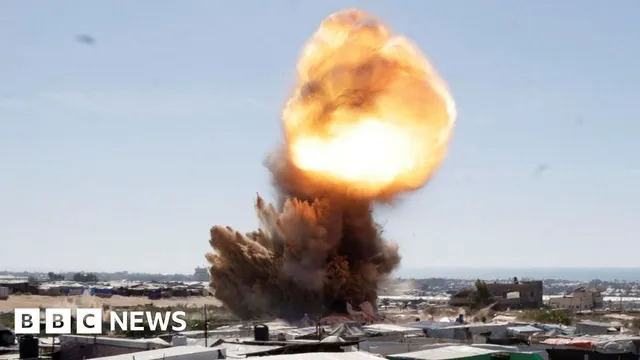
Hamas proposes seven-year truce amid growing conflicts in Gaza
2025-04-24 05:01- A new ceasefire plan has been proposed by Egyptian and Qatari mediators, aiming for a truce lasting five to seven years.
- Public sentiment against Hamas is growing in Gaza, with residents openly protesting and criticizing the group’s governance.
- The evolving dynamics suggest Hamas's grip on Gaza may be loosening as public frustration with both Hamas and Israel intensifies.
Express your sentiment!
Insights
In Gaza, tensions continue to escalate following a significant attack by Hamas against Israel on October 7, 2023. This assault resulted in the deaths of approximately 1,200 individuals, predominantly civilians, and the taking of 251 hostages back to Gaza. In response, Israel initiated a large-scale military operation which has reportedly killed over 51,240 Palestinians, according to reports from Gaza's health ministry, signalling a dire humanitarian crisis in the region. As the conflict endured, a senior Palestinian official revealed a proposal from mediators in Qatar and Egypt suggesting a ceasefire lasting between five to seven years. This proposition includes terms such as the return of all Israeli hostages in exchange for Palestinian prisoners, an official conclusion to the ongoing war, and a complete withdrawal of Israeli forces from Gaza. Despite the ongoing negotiations, Israeli Prime Minister Benjamin Netanyahu stated that the war would not cease until Hamas is defeated and all hostages are returned, expressing a tough stance against any concessions to the militant group. Recent developments indicate a potential shift in public sentiment within Gaza, where citizens are increasingly voicing their dissatisfaction with Hamas's governance. Citizens no longer seem intimidated by the group's authority and are criticizing its actions both on the streets and through social media. Protests against Hamas highlight a rising defiance amidst the backdrop of relentless bombardment by Israel, with Gazans holding both parties accountable for their predicament. Hamas, which has maintained control over Gaza for nearly two decades, appears to be experiencing some decline in its influence as protests gain momentum. Civilians, exacerbated by years of conflict and despair, are beginning to demand accountability. Hamas has even signalled a willingness to transfer governance to an alternative Palestinian authority, such as the West Bank-based Palestinian Authority, should it be mutually agreed upon, further complicating the political landscape in the region.
Contexts
The history of Hamas governance in Gaza is a complex narrative shaped by political, social, and military dynamics since the organization rose to prominence in the late 20th century. Established in 1987 during the First Intifada, Hamas initially emerged as a grassroots Islamic movement advocating for the Palestinian cause against Israeli occupation. In 2006, Hamas won a significant electoral victory, obtaining the majority of parliamentary seats, which led to a power struggle with the rival Fatah party. This conflict culminated in the violent takeover of Gaza in 2007, resulting in Hamas consolidating its political power and establishing a de facto government, which has persisted ever since, despite international dissent and blockade from Israel and Egypt. Hamas governance has faced numerous challenges, particularly regarding the humanitarian situation in Gaza. Under Hamas rule, the region has experienced severe restrictions on movement and goods, largely due to border controls and military conflicts with Israel. The blockade has had profound implications for the economy, public health, and social services, with the United Nations frequently highlighting the dire living conditions faced by civilians. Despite these issues, Hamas has managed to maintain a significant level of social support through the provision of welfare services, education, and healthcare, often filling gaps left by the Palestinian Authority and international organizations. Militarily, Hamas has engaged in several conflicts with Israel, with key escalations in 2008-2009, 2012, and 2014. These confrontations have reinforced its position as a resistance movement while drawing international criticism for tactics such as rocket fire into civilian areas. Each conflict has further entrenched the cycle of violence, leaving a legacy of trauma that affects both Gazans and Israelis. Hamas's military wing, the Izz ad-Din al-Qassam Brigades, has been pivotal in its identity, executing both defense and military strategies explicitly targeting Israeli forces, reflecting their commitment to resistance as a primary element of their governance. In recent years, the political landscape within Gaza has also been impacted by shifting alliances and the evolving regional dynamics. As of 2023, internal divisions within Hamas, pressures from other Palestinian factions, and the wider geopolitical context, including relations with Egypt, Iran, and Turkey, have influenced its governance approach. Despite calls for reconciliation with Fatah and broader Palestinian unity, ideological rifts remain evident. The future of Hamas governance in Gaza will likely continue to be shaped by these internal and external factors, with ongoing humanitarian concerns and the pursuit of political legitimacy as critical undercurrents in this historical narrative.